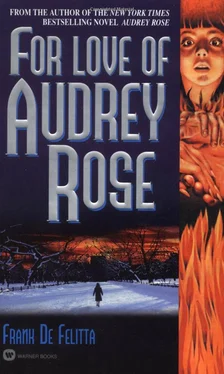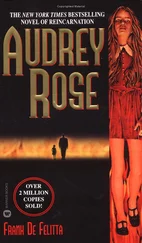“Ivy could not have passed through,” he said gently. “She could not have passed through into the radiance… dissolving… into a circle of pure light.” Then, softly: “Hoover was wrong, Janice. Our daughter’s soul is not at peace. She’s back. Ivy’s come back. ”
Just then the main room light suddenly went on, hurting their eyes, and Dr. Geddes stood at the door. He studied them both for a few seconds.
“How are you feeling, Bill?” Dr. Geddes asked.
“Oh, better. Much better. Listen, I feel pretty rotten about what happened. I promise it won’t happen again.”
“I hope not, Bill. It really wasn’t like you.”
Dr. Geddes smiled awkwardly, sensing he had broken something between Janice and Bill, but not certain just what.
“Would you like me to call down to the gate for a taxi, Janice?”
“Yes, please—”
When Geddes left, there was a momentary impasse. Bill made a few desultory efforts at cleaning the debris from the floor. Janice joined him by carefully, timidly, scraping together the sheets and note cards into neat piles.
“I’m going to need your help,” he whispered.
She stopped. “What kind of help?”
“I’ll call you at home. Now just keep picking up these papers. I don’t want Dr. Geddes to get wind of anything.”
They worked in silence until she saw the headlights of a taxi moving up the driveway.
“It’s the cab,” she said. “I’d better go.”
“Okay. Good. I won’t call you tonight. They listen to your calls around here, no matter what they tell you. I’ll find a way to call you in a couple of days.”
They heard Dr. Geddes’s footsteps coming. Janice stood up.
“I’d like to discuss your prescriptions,” Dr. Geddes said. “I mean, with your wife. So she’ll understand.”
“Sure, doctor,” Bill said, eager to restore a working relationship with Dr. Geddes. Janice embraced Bill. “I’ll call you. I’ll need your help,” he whispered in her ear.
Then he separated from her and smiled broadly.
“Good night, darling,” he said just a trifle loudly. “And thanks a million for coming down. I don’t know what happened. I just — just flipped out—”
Dr. Geddes drew Janice discreetly off toward the lobby.
“This episode with Mr. Borofsky,” he said uncertainly, “it worries me a great deal. I think you’ll agree that a visit home is out of the question.”
Janice said nothing. She turned slowly and looked casually over her shoulder at Bill through the open door of his room. He caught her looking at him and smiled.
“I think he knows he’s in trouble,” Dr. Geddes continued quickly. “I really can’t countenance a departure from observation at this time. Do you disagree?”
The sudden cancellation of Bill’s visit seemed to push the boulder back in front of Bill’s tomb. Janice felt an overpowering sense of relief.
“No,” she said, trying not to sound eager. “You’re right.” She hurried out of the building, over the slippery gravel, and into the taxi.
The train ride back into the city flashed by like a jagged nightmare, whispering voices, hissing insinuations, and the people waiting at the stations loomed like twisted piles of flesh, already decomposing.
During the next weeks, Bill telephoned almost daily. He wanted books. He read Janice the titles of pamphlets he needed. He wanted her to write letters to several authorities in New York, and to a psychiatrist in Berlin. Impatient for her replies, he began to call her at work.
He needed copies of articles from the encyclopedias of religion at the New York Public Library. Mailed special delivery to the clinic. When she visited him, he cross-examined her ruthlessly. He tried to trip her up to see if she had really made the telephone calls, really written the letters. Exhausted, she shoved the written replies in his face and he mumbled an apology.
Finally, at work, Bill called and demanded that during her lunch break she visit the Temple where Hoover had last been seen.
“I can’t go there, Bill,” she whispered into the telephone, her fingers angrily toying with her paintbrush on the drafting table.
“Why the hell not?”
“It’s where I went to the service for Ivy. I–I just don’t want to go back there.”
“I’ve got to know the answers!” he said loudly.
She held the receiver away from her ear.
“I’m sorry I yelled,” he said. “Look, just a few questions. I’m going crazy here. Geddes won’t let me out for another month.”
“All right, Bill,” she said, reaching for a pencil and note pad. “Read me your questions.”
Bill slowly and distinctly read several technical questions. They involved the time delay in return of the soul. Whether time functioned in a different mode between death and the new life. Whether one could rely on earth clocks and calendars in computations.
“What do you mean, computations?” Janice asked warily.
“Never mind. Just go there. Ask the high priest or whatever he’s called. And call me back when you’ve found out.”
“Well, I can’t go today.”
There was a suspicious silence at the other end.
“Why not?”
“Because I’ve already had my lunch break and this will take at least an hour—”
“Then say you’re sick.”
“I won’t say I’m sick, Bill. I’m not going to cut out of work for this.”
“But you have to, Janice. I’m depending on you!”
“I’m happy to do the favor for you,” she said, trying to hold her temper. “But I’m not going to risk my job!”
“All right. Don’t get sore. Call me when you can.”
He hung up without saying good-bye.
The next day, Janice gulped a sandwich while riding to Greenwich Village in a taxi. She remembered the Hompa Hongwanji Temple all too well: the murmurs and chants, the smell of incense. She remembered a white-haired priest, called, simply, the Master.
The front of the Temple had been defaced by vandals, black spray paint over the door spelling out a code for the street gangs. Inside, several thin youths sat on a bench improbably donated by a neighboring church, and seemed to stare vacantly at where the altar should have been. Only there was no altar — simply a mass of flowers in white stone basins, sticks of burning incense and, nearly buried under the bright foliage, a faded color photograph of a yogi in cross-legged position.
It all seemed familiar, yet frightening. She clutched the list of questions in her hand.
“Excuse me,” she whispered, disturbing the tranquility of a short, young man with rimless glasses. “Is the Master in?”
“He’s in meditation.”
“Will he be through soon?”
“Not likely. Can I help you?”
She smiled. “I had some questions—”
“Yes, of course. We all do. Do you want a cup of tea? We can talk about them on the bench at the back of the room.”
“All right. Thank you.”
From a low table he picked up a small pot of tea, poured it into two perpetually stained cups, and offered her one. He waited patiently.
Nervously, she referred to her list of questions.
“My, er, husband,” she said, “would like to know some details about time. That is, time as it exists after death.”
The youth smiled.
“Your husband sent you here instead of coming himself?”
“He’s not well.”
“I see. I’m sorry. Please, sit down.”
They sat under a poster of the Taj Mahal, donated by the India Tourist Board. It too had faded in the sunlight from the windows, and the famous white walls looked surprisingly blue green.
“Time as it exists after death is the same as time during life. Time is like an enormous field on which the game of life is played. It does not change if a person dies.”
Читать дальше












